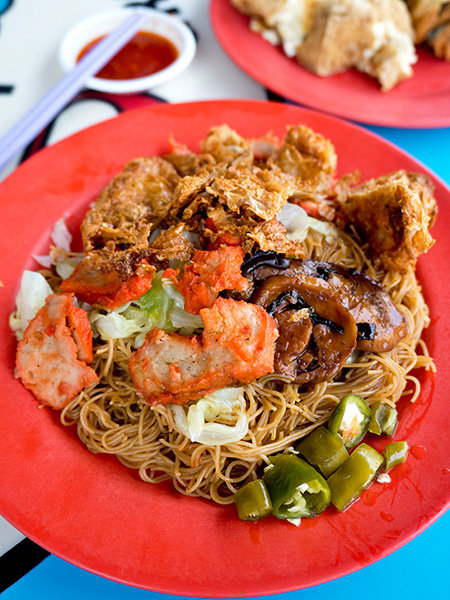Vegetarianism is gaining popularity in the recent years. Many advocate for the consumption of plant-based foods and reduction of animal products’ consumption not just for health reasons, but also for environmental sustainability. But is a vegetarian or vegan diet suitable for you?
Vegetarian diet typically refers to an eating pattern that excludes meat and fish products. Unlike vegans, vegetarians may include dairy products and/or eggs in their daily diet. Vegan diet is a type of vegetarian diet that excludes fish, meat, eggs, dairy products and all other animal-derived ingredients.

While vegetarian and vegan diets may have shown positive effects in reducing weight among overweight adults and lowering LDL-cholesterol (bad cholesterol), they are not by default nutritious and wholesome. A typical vegetarian meal in Singapore, for instance, can be high in saturated fat, sugar and salt (think deep fried mock meat, hash brown, chips, gulab jamun and rojak). In addition, vegetarian and vegan diets may not be suitable for everybody. For example, adolescents, pregnant women and female endurance sports athletes have higher risks of developing iron and/or vitamin B12 deficiencies if they follow a vegetarian or vegan diet.
Vitamin B12 deficiency is common among vegans as this vitamin is present naturally in animal products only. Vegans and vegetarians who do not consume dairy products may be at risk of developing calcium deficiency. Also, iron found in plant foods is less readily absorbed by our bodies than iron in animal products, hence it is important for vegans and vegetarians to include adequate iron in their diet. Vegetarian diets (vegan especially), generally provide little or no omega-3 fatty acids, which can be found in oily fish (e.g. salmon, mackerel, sardine) and are required for our brain, eye and immune functions.
If you decide to follow a vegetarian or vegan diet, it is important for you to plan a well-balanced diet which includes a variety of fruits, vegetables, wholegrains, beans, seeds, nuts, soy products, eggs and low fat dairy products to ensure that you obtain essential nutrients for maintaining good health.
Here are some dietary strategies to boost your intake of:
- Vitamin B12
- Vegetarians can obtain vitamin B12 from dairy products and eggs.
- Vegans should include foods fortified with B12 (e.g. breakfast cereals, yeast extract) in their diet or consider a vitamin B12 supplement.
- Calcium
- Milk and cheese are rich sources of calcium.
- For vegans, dark green vegetables such as kale, Chinese spinach, Chinese mustard greens, bok choy and broccoli as well as almonds, calcium-fortified soymilk and tofu are also good plant sources of calcium.
- Iron
- Include iron-rich foods e.g. dark green leafy vegetables, dried apricots, raisins, nuts, seeds, dried beans and peas, and wholegrain products in daily diet.
- Eat fruits and vegetables rich in vitamin C (e.g. broccoli, tomato, citrus fruits, strawberries) with iron-rich foods as vitamin C promotes absorption of iron.
- Avoid coffee and tea at mealtimes because tannins in tea and coffee interfere with iron absorption.
- Omega-3 fatty acids (e.g. DHA, EPA)
- Marine algae (including seaweed) are the primary source of DHA (docosahexaenoic acid) and EPA (eicosapentaenoic acid) for vegetarians and vegans.
- Flaxseeds, chia seeds and walnuts are alternative sources of omega-3 fatty acids. Though these omega-3 fatty acids may not be converted to DHA and EPA as efficiently in our bodies, avoiding foods high in saturated fat and trans fatcan improve this conversion process.
- Include food products fortified with omega-3 fatty acids when possible.
Consider dietary supplements if you are unable to obtain adequate vitamins and minerals from diet.
References:
- Dietitians of Canada. What sources of DHA and EPA are acceptable to vegetarians? In: Practice-based Evidence in Nutrition® [PEN]. 2014 Feb 18 [cited 2019 Apr 23]. Available from: http://www.pennutrition.com. Access only by subscription. Click Sign Up on PEN login page.
- Dietitians of Canada. How much calcium is absorbed from calcium-enriched foods and beverages, such as orange juice, soy and rice beverages, and tofu made with calcium and unfortified plant foods? In: Practice-based Evidence in Nutrition® [PEN]. 2012 Mar 11 [cited 2019 Apr 23]. Available from: http://www.pennutrition.com. Access only by subscription. Click Sign Up on PEN login page.
- Evidence-based Nutrition Practice Guideline on Vegetarian Nutrition published September 2011 at https://www.andeal.org/topic.cfm?cat=4021 and copyrighted by the Academy of Nutrition and Dietetics. Accessed 23 April 2019.
At Jaga-Me, we believe that healthcare should be a social good – it is a basic human need, and should be available to as many people as possible. We aim to deliver the highest quality care through innovation and a commitment to building meaningful relationships.
Save travelling and long wait times at the hospitals. Get specialised medical treatments:
– Urinary Catheterisation
– Complex Wound Care
– Nasogastric (NG) Feeding Tube
– IV Infusion Therapy
Jaga-Me: Your Trusted Medical Home Care Professional





